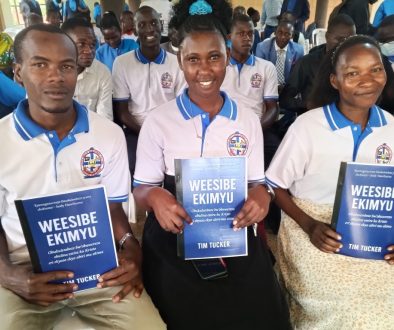Leadership Myth Busting #5… the ‘frontline’ of missions
This is a guest post by Pete Portal taken from his book, No Neutral Ground: Finding Jesus in a Cape Town Ghetto. Pete has lived and served in Manenberg, one of Cape Town’s most notorious gang-infested communities, over the past decade. The book tells stories of God’s mighty works, as well as relapse, hopelessness and despair; the miraculous and the mundane, heaven and hell, all balanced on a knife-edge.
The Myth of the Frontline
I think I know what people are alluding to when they say that because we live in Manenberg, we are ‘ministering on the front line’. I think I know what they mean. We have had two bullets fly through our office windows during gang fights, dear friends and family have been killed, our houses have been broken into by those we have been trying to serve, we’ve seen miraculous financial provision come in as we’ve prayed for salaries or emergency rehab funds, we’ve watched friends come painlessly off drugs through the power of the Holy Spirit, and felt the hope drain out of us as others crash and burn for the umpteenth time, and we’re all committed to living among the poor and marginalised.
But here’s my issue with the F word – isn’t this just the normal Christian life? What else do we honestly think following Jesus is about? He did miracles of great power, loved until it hurt, equipped his disciples to cultivate counter-cultural communities of faith, celebrated the outcast, and obediently followed the Father’s voice (despite Peter’s sensible-sounding but ultimately demonic advice to the contrary) all the way to Calvary. Then he told us to ‘go do the same’. I sometimes wonder where the concept of ‘front-line’ ministry came from. Might it have come out of the boredom of the Christian ghetto – where Jesus’ passions have largely been replaced by chatting about church culture or running Christian courses while sipping a cold drip coffee and Instagramming a photo of our homegroup?
The notion of ‘front-line’ ministry creates two problems. It disempowers and it dichotomises. Let me explain. You’ll rarely hear those who are part of ‘front-line’ ministry describing their lives that way. It’s a term generally used by Western Christians who don’t spend their lives, say, preaching on street corners or living among the poor. And it’s a concept that automatically disempowers those who subscribe to it – because it implies they aren’t ‘doing the stuff’, ‘sold out for Jesus’, or ‘living a life of sacrifice’ (to use the clichéd phrases), and are unable to, living as the do in middle-class suburbia. Is it any less ‘front line’ to stack supermarket shelves, or buy out bankrupt companies, or sell cars, or arrange flowers, or raise children a home, or make multi-million-pound deals in a boardroom? As Bill Johnson has helpfully put it, ‘there is no such thing as secular employment for the believer. Once we are born again, everything about us is redeemed for Kingdom purposes. It is all spiritual. It is either a legitimate Kingdom expression, or we shouldn’t be involved at all.’ It’s got to be true that any vocatio can be ‘front line’ – if we live with the deep-set conviction that we have been placed in a specific sphere of influence to represent Jesus and make him known.
Once during an ugly gang fight in Manenberg I went to buy milk from a local house shop run by a Somali man. This involved running from the door of our office building, looking left and right to make sure no one was about to blow my head off, and nervously jog-walking across the road. The shopkeeper was stood behind a metal grille that was not remotely bullet-proof. He’d been there all morning witnessing the gun battles on the street. I asked him if he was doing OK and how he was dealing with life on the front line. His reply was a belter: ‘My friend, I’m from Mogadishu – living in Manenberg is easy! It’s pieces of cake!’ I wandered back to the office, struck by how relative everything is. I grew up in middle-class Sevenoaks, half an hour south of London, in the county of Kent, aptly named the Garden of England. The only gang I came into contact with, growing up, was a group of prepubescent kids roller-skating on a road up from ours who called me name. And to me, some of the things that go down in Manenberg are pretty shocking. Yet, had I grown up in war-torn Mogadishu, my perspective of Manenberg would be completely different.
And so I wonder if the ‘front line’ might be a myth. I wonder if, like the single story, it really exists. Might it be yet more evidence of the unhelpful dichotomy we’ve established between what is seen as being sacred and what is termed ‘secular’. That a dichotomy has been created between the sacred and the secular is no secret. But it’s unbiblical. To assert one vocation as being secular and another as front line is theologically wrong… So let me say it again: we are all in front-line ministry if we are doing what God has asked us to do.
Pete is originally from London but has lived in Cape Town since 2009. He left a promising career in children’s television to move to Manenberg, one of South Africa’s most notorious communities. He and his wife Sarah serve on the Core Leadership Team of Tree of Life, a church community in Manenberg that runs ministries among the vulnerable and marginalised.




